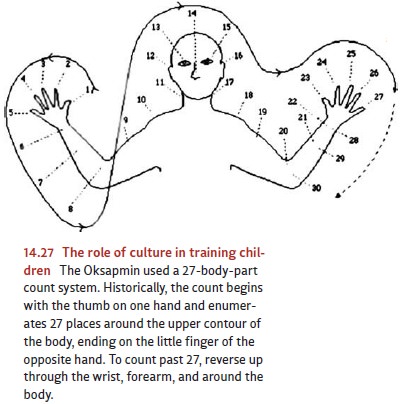Chapter: Psychology: Development
The Role of Culture - Socioemotional Development in Infancy and Childhood
THE ROLE
OF
CULTURE
Another
source of differences among children comes from the cultural context within
which the child
develops. Some cultural influences
on development are
obvious. In ancient Rome, for example, educated children learned to
represent num-bers with Roman numerals; modern children in the West, in
contrast, learn to represent numbers with Arabic numerals. Modern children in
the Oksapmin culture (in New Guinea) learn yet a different system, counting
using parts of the body rather than numbers (Figure 14.27; Saxe, 1981). In each
case, this culturally provided tool guides (and in some cases,
limits) how the
children think about
and work with numerical quantities.

In
addition, some social and cultural settings involve formal schooling, but
others do not, and schooling is a powerful influence on the child’s development
(Christian, Bachman, & Morrison, 2000; Rogoff et al., 2003). Cultures also
differ in what activities children are exposed to, how frequently these
activities occur, and what the chil-dren’s
role is in the activity. These factors
play an important
part in determining
what skills—intellectual and motor—the children will gain and the level
of skill they will attain (M. Cole & Cole, 2001; Laboratory of Comparative
Human Cognition, 1983; Rogoff, 1998, 2000).
In
understanding these various cultural influences, though, it is crucial to bear
in mind that the child is not a passive recipient of social and cultural input.
Instead, the child plays a key role in selecting and shaping her social
interactions in ways that, in turn, have a powerful effect on how and what she
learns.
Part
of the child’s role in selecting and shaping her social interactions is defined
by what Lev Vygotsky (1978) called the zone
of proximal development. This term refers to the range of accomplishments
that are beyond what the child could do on her own, but that are possible if
the child is given help or guidance. Attentive caregivers or teach-ers
structure their input to keep the child’s performance within this zone—so that
the child is challenged, but not overwhelmed, by the task’s demands.
Importantly, the child herself provides feedback to those around her that helps
maintain this level of guid-ance. Thus, caregivers are able to monitor the
child’s progress and, in some cases, the child’s frustration level, as a
project proceeds, and they can then adjust accordingly how much help they
offer.
The
child also plays an active role whenever the processes of learning or problem
solving involve the shared efforts of two or more people (after Rogoff, 1998).
In such cases, it is clear that we cannot understand development if we focus
either on the child or on the social context; instead, we must understand the
interaction of the two and how each shapes the other.
One
example of this interplay is seen in the child’s capacity for remembering life
events. This capacity might seem to depend entirely on processes and resources
inside the individual, with little room for social influence. Evidence
suggests, however, that the capacity for remembering events grows in part out
of conversations in which adults help children to report on experiences. When
the child is quite young, these conversa-tions tend to be one-sided. The parent
does most of the work of describing the remem-bered event and gets little input
from the child. (“Remember when we went to see Grandma, and she gave you a
teddy bear?”) As the child’s capacities grow, the parent retreats to a narrower
role, first asking specific questions to guide the child’s report (“Did you see
any elephants at the zoo?”), then, at a later age, asking only broader
questions (“What happened in school today?”), and eventually listening as the
child reports on some earlier episode. Over the course of this process, the
parent’s specific questions, the sequence of questions, and their level of
detail all guide the child as he figures out what is worth reporting in an
event and, for that matter, what is worth pay-ing attention to while the event
is unfolding (Fivush, 1998; Fivush & Nelson, 2004; K. Nelson & Fivush,
2000; Peterson & McCabe, 1994).
Of
course, parents talk to their children in different ways. Some parents tend to
elaborate on what their children have said; some simply repeat the child’s
comments (Reese & Fivush, 1993). For example, Mexican Americans and
Anglo-Americans differ in how they converse with their children and in what
they converse about, with Mexican Americans’ emotion talk tending to be less
explanatory than Anglo-Americans’. There are also differences in adult-child
conversations if we compare work-ing-class and middle-class parents (see, for
example, A. R. Eisenberg, 1999).
In
each case, these differences in conversational pattern have an impact on how
the child structures his or her memory. As one example, evidence suggests that
American mothers talk with their children about past events much more than
Asian mothers do (Mullen & Yi, 1995). These conversations may help American
children to start organiz-ing their autobiographical recall at an earlier age
than Asian children. Consistent with this suggestion, when Caucasian adults are
asked to report their earliest childhood memories, they tend to remember events
earlier in life than do Asian adults (Fivush & Haden, 2003; Mullen, 1994).
The same logic may help explain why women tend to remember events from earlier
in their lives than men do. This difference in memory may result from
differences in the way parents converse with their sons and daughters (Fivush
& Haden, 2003; Fivush & Nelson, 2004).
Related Topics